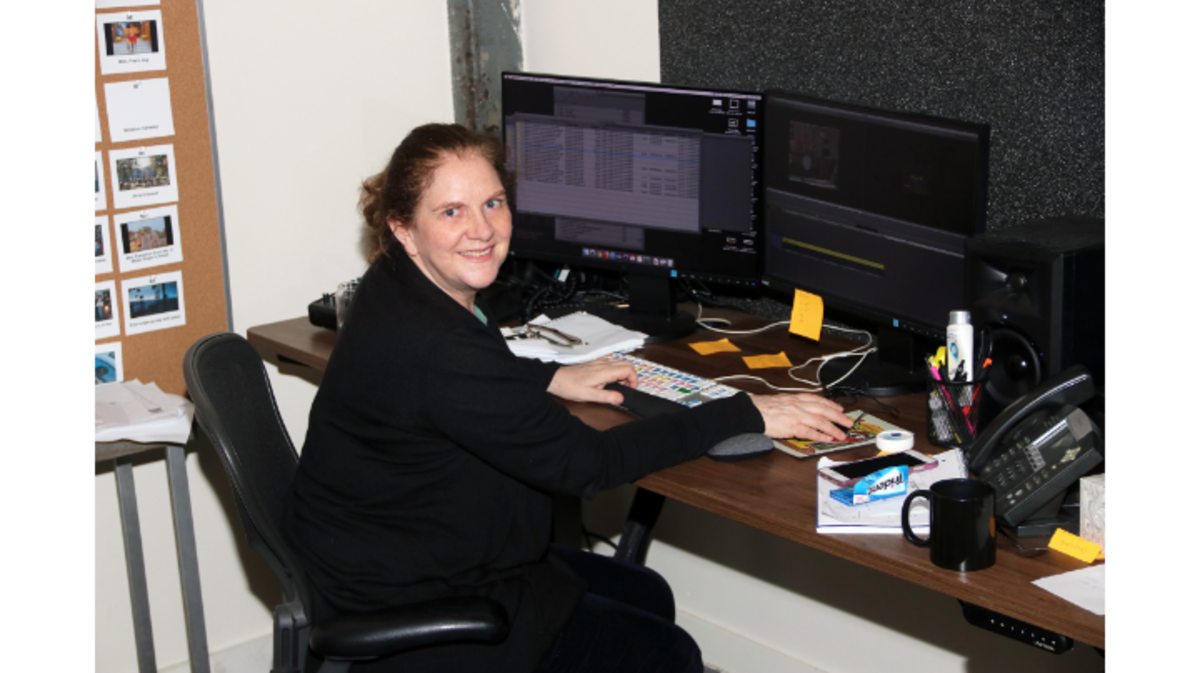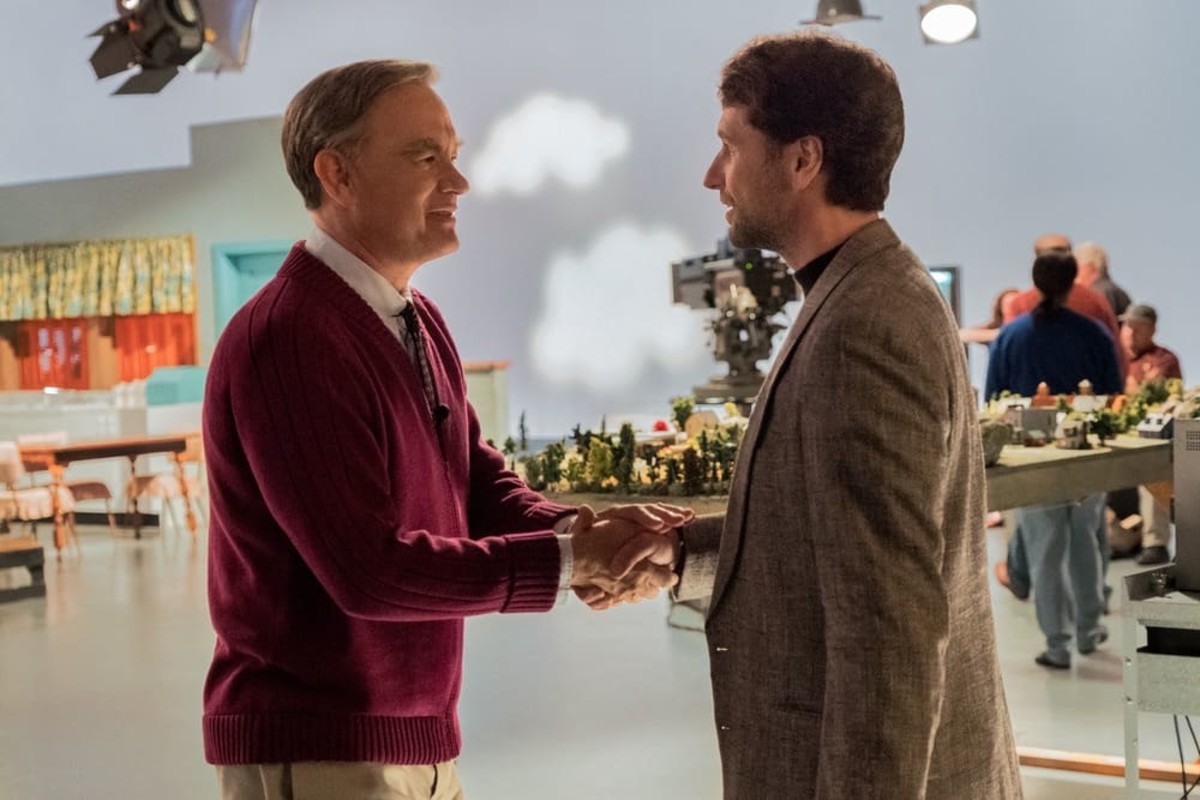Susan’s Interview for ‘Script Magazine’: “A Beautiful Day in the Neighborhood” Editor Anne McCabe
Susan Kouguell speaks with Anne McCabe ACE, editor of “A Beautiful Day in the Neighborhood,” who started as an Apprentice Editor in the cutting rooms of Woody Allen, Brian de Palma and Sidney Lumet.
NOV 28, 2019
About A Beautiful Day in the Neighborhood
Tom Hanks portrays Mister Rogers in A Beautiful Day in the Neighborhood, a timely story of kindness triumphing over cynicism, based on the true story of a real-life friendship between Fred Rogers and journalist Tom Junod. After a jaded magazine writer (Emmy-winner Matthew Rhys) is assigned a profile of Fred Rogers, he overcomes his skepticism, learning about kindness, love and forgiveness from America’s most beloved neighbor.
Interview with Editor Anne McCabe

It was wonderful to chat again with Anne McCabe ACE, editor, for this publication. Our first interview centered on her editing work on the award-winning and Oscar-nominated Can You Ever Forgive Me.
McCabe started as an Apprentice Editor in the cutting rooms of Woody Allen, Brian de Palma and Sidney Lumet. She collaborated with Director Greg Mottola on several projects, including The Daytrippers, Adventureland and the award-winning pilot for HBO’s Newsroom. She also worked closely with Kenneth Lonergan on the Academy Award-nominated film You Can Count On Me, and Margaret. Her television credits include Nurse Jackie, Damages, Younger and Succession. Navigating both drama and comedy, she cut Chris Rock’s acclaimed movie Top Five.
We began this interview talking about a Facebook post I read about A Beautiful Day in the Neighborhood that stated: Check your cynicism at the door.
McCabe: We all felt the same way. I watched Mr Rogers Neighborhood as a kid, and I was drawn to it but I thought it was so hokey, and when I was older I thought, I really don’t need this kind of show anymore. But then you realize you don’t really understand what Mister Rogers is doing; he’s introducing all these different types of people. Lloyd is that type of character who’s cynical.
When cutting the movie, I put myself in Lloyd’s shoes, but he does get won over. Lloyd’s trying to get dirt on Mister Rogers, but he starts getting under Lloyd’s skin, and you also realize that Mister Rogers was a complicated human being. But there is no dirt, He’s a person with his own struggles. It’s hard to talk about these difficult subjects and feelings and emotions, and what it’s like to be a parent. Working on the movie, we were all going through things. I’m a parent, Marielle (Heller) is also a parent and while we were cutting, we were asking ourselves, how does this make us feel, and looking through that lens while we were editing.

Kouguell: This is the second feature you worked on with director Marielle Heller, The first film,Can You Ever Forgive Me? (centering on the writer Lee Israel) was also based on, or inspired by, actual events.
McCabe: Both films are about an odd friendship about one person who is comfortable in their skin and one who is not, but besides that, Lee and Jack (in Can You Ever Forgive Me?) and Mister Rogers and Lloyd could not be more different characters.
With A Beautiful Day in the Neighborhood we felt a huge responsibility to the original television show, so there was a whole other level involved. We did tons of research, we looked at all the old shows, and books. The two films have a different tone.
Kouguell: These two projects happened so close together, which is quite an achievement.
McCabe: As Can You Ever Forgive Me? was finishing up, Marielle told me about this script she was working on, and I was thrilled at the chance to work with her again. The funny thing is that in between the two movies I worked on Succession, which couldn’t be more different than A Beautiful Day in the Neighborhood so there was a huge contrast between the two projects. Often I work on comedies and things like that so this movie was very special for me to work on.
Kouguell: How has your collaboration with Heller evolved over this time?
McCabe; Working with her a second time was great because we have a shorthand, You achieve a trust especially when you’ve worked together prior on a movie you’re proud of. You trust each other more and you can be more open. We are very comfortable with each other, and we have a very creative cutting room, bouncing ideas off each other.
Kouguell: The film was shot on the same stage with the same camera that filmed the original Mister Rogers Neighborhood series. Were there specific editing choices you made to capture the original series?
McCabe: Yes, one was the rhythm. Mister Rogers Neighborhood is so not slick. Like when Mr. Rogers opens the doors to reveal the pictures behind them, it’s made of cardboard and paste; he didn’t do things in a kind of slick way, everything was very homemade, The production designer did an amazing job of recreating the original show. And it was the same with the editing style, we knew it shouldn’t be super slick or flashy or smooth. Sometimes we intentionally had types of bumpy cuts and the way that it was shot wasn’t high tech. We imitated that style of editing.
Kouguell: Mister Rogers had a distinct speaking rhythm, which is captured in the editing with the slow speaking style yet the film never felt slow.
McCabe: Tom Hanks and Matthew Rhys did an incredible job. There was tons of fantastic material, and a lot of sifting through and making sure we were keeping true to the right cadence in the way Mister Rogers spoke. It’s not a quick film in the way it’s edited, but you needed to feel that focus at all times. As usual, the first cut was a good hour longer than the movie ended up being, so of course we had to shape the story and the performances and craft the rhythms of the movie.
Kouguell: It never felt slow, and I’m a very impatient person.
McCabe: (laughing) So am I. I worked a lot in comedy, and I had to shift my perspective. The film is sincere. It’s about emotion and it’s about feelings. There’s humor in the film but it’s not the cynical humor and it’s not a quick joke. It’s more about the building up of the tension between the characters.
Kouguell: What’s next for you?
McCabe: I’m currently working on Land with Robin Wright who’s directing a feature; it’s about a woman who has PTSD who takes herself off the grid and goes into the wilderness. It’s a beautiful film shot in Canada.
Kouguell: Advice for aspiring editors and filmmakers?
McCabe: It’s incredibly difficult to do, but you need to show your movie to groups of people and not necessarily your friends and family. Be imaginative and open to reinvent what your intention was. You can’t have a good movie without a good script. You can’t have a good movie without good actors. And the edit is another opportunity to get things right and to rethink. Sometimes you have to reimagine the project or start the show or the movie with a completely different scene than what was written originally, or reorder the scenes, or leave the joke out even if you think it’s totally hilarious. In A Beautiful Day in the Neighborhood we had to lose things that we really loved because you can’t keep it long — you know that expression: kill your darlings.